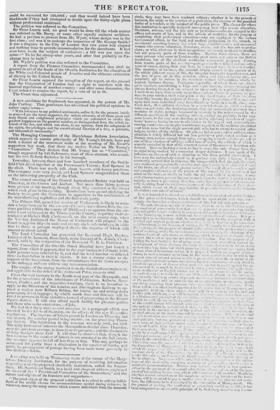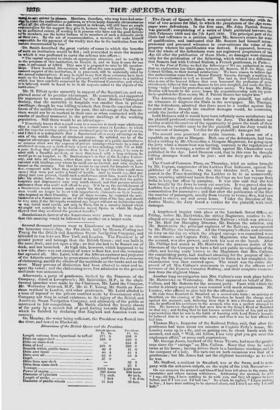A ir„ . cting was held on Wednesday ifiela at the rooms
of time Mary- leboue Literary institution, for the purpose of receiving information resift:eel:a; a newly-projected charitable institution, called the 11e. Soatliwt:tod.Sntith, in a lucid and eloquent address, explalned the views of ties " Provisional Committee of the Sanatorium," and the nature and objects of its thunders and supporters— Time great object of the proposed institution is to afford to solitary indivi- duals of the middle classes the accommodations needed during sickness; by whetever) among the mammy cattscs which remove individuals from the domestic circle, they may have been rendered solitary; whether it be the pursuit' of business, the study or the practice of a profession, the exercise of the practical duties of a teacher, or the conduct of the public press. Time classes for whom this institution is specially designed are—young men svho persue education, literature, science, and the fine arts as professions—wbo are engaged in time, offices and courts of law, and in the schools of medicine, for the purpose of completing their professional education—who are employed in the various Government offices, in the legal and medical professions, in the church, irt merchants countnig-houses, and. other large establishments; and uninarrice women who pursue education, literature, Music, and the hue arts as profes- sions; or who, whatever be their occupations, are merely residents in families, but not properly parts of those families. Besides these classes. them are many persons who come to London—the great mart, not only of the British dominions but of the elm ii iced world--tom commercial parposcs. Coining from remote parts of the comity—perhaps even from distaht nations—they must of course, during their stay here, be separated from th.-ir own funilieg. 'rime anxieties of business, the unusual fatigue caused in the intrsuit of it, the widely different mode of life, the irregular hours, the imperti)ct rest, anti the loss of Imre air in this crowded, aetive, and life-, ), ntaing city, tare peculiarly apt- to induce in its transient visiters 111.11spositien, '1iielm, by neglect, becomes disease. Fored,olers t': h'11 of whom Ilsee are always:
great ti ii constituting a large and rapid current, always changing but
always flowing through it are sal).ject to these evils in a preeMiinent degree. I need do no more than M....ruly name these carions (,)1:se:: of posons, to 1)r3- 11.1lee lit your 111111(1S :I VIV:11. conception of Ow )1esol,oteiless ),‘: their situation when they become the stiltj,)ets of llsease. Yoe]. imaghtetion will et once etill up to view SOMe 111t11%1•111.11 :May from friends or home, in a small, close, con-
timid, dark, chamber, in a crowded street, in which no human
can get alnico the deafening sounds that are unceasingly priiiinced from morning to night, perhaps increased in hitemity by the noises caused by the different operations of the working artisan, carriel on, probably, in the very same house, in the very next eletaibey, or in the adjoining chambers of neigh- bours' houses; having no one to affinetister to III!3 urgent anti constantly-re- eurring wants—no one to give nourishment required, or the medicine prescribed —at least, none hut the single servant-girl, who has to attend to Revolt' other lodgers, besides all the children. Or you see before you aoother sti fferer, whose situation is widely different but not less if:fiend—a profteslental steleut or literary man, remote enouli from noise, occupying a small :.:. ;0).-..)tre cell io one of those clusters of buildings called inns of court, the eeiiinhs if which is scarcely exceeded by that of the remotest corner of the rem)) -t V•nerican wil- derness. Here no ibutstep eemes, no the is seen; the only el: 1),..,c) from day to night being irctrked by a someirliat deeper darkness. I can si)eak of the influence on tli,eettse of sitell a situation as this froni painful ob.-a:vat:an. I
have seen the melancholy caused by it prodace very early , on. I havc constantly noticed that in this case the imagesiii ii elm 110 0 tbahugh the mind,
of the brain, are all of a most gloomy natur ): the vosalt »0, ,)
now rendered preternat orally i.;:ensitive and . %end vc 2's • • ;
and complete exlianstimi of the powers of life, causeh mind on the lonly, as wholly to baffle the :int and sk]il t'nder toK.1.1eireltIll,tanCeS,I)tr,MS die, not so nittail from Ch. •:..: malady, as from a persuasitel that they ;oust rally resulting frOM the Whit' of time tion, which steins to their app....hem:ion to pieelinlo alieviations itild aids 01 sickness.- It Was intended et fottnel au te-attldish of the great (deb-Itemises, em. Heil she'll)] tempplv the lux te.i.ts eel ete, • "To tenth that /tier. et) tel fitt• tt site nurse--the 1, -; puldic bonen) which i,.
the tiaining up a more :•:'. t
()sea that these clam:her: shot) medical and surgival neighbourhood, or are .1es:i.;;,:s • ;.• th..; eauntry, for the pacpme or 'Cl )10. of ;4 curing, tinder the ;a, - llistiion ty. not It/ .1 t requi-
- hilt (me in-
) .•»'":0) »on t
'
there will he a medical r.1 respunsit0,t; to them, eh, ee. fidelity with which atur. t. • "),. It e.t is a fundamental princip10 ;
.; .ectiti ; :•
),!.. with t.: •
» .
-.Cam will
evithin its Iran); by )0;:-•
- . I •:,:ti.
any patient within it, tt
of the establishment v ' ' unless it be th» mutual the medical ollivers of iiik. it by this institution to ) •
their patients: but els.) p'-:),,,,-; ); • is:. I si 1 !)„...) 'Ir::).....lt
treat sonie of theirs ptients owlet
eover- of health than !..m._)y at ), '.al at their 0W11 alintic. '1'1 ' )•-ty partly bv a small »»;)» mo gitin().) Per annum ..
siding in the establ;0:: :
This iatter `,11!,I, tilt' ,tiu.. '‘) ii 'ice by the Committee ),..• l'a:1 ) . :.• limo which 1-11() (,•,; ( .• - ;;',• i 1e; • constant ste :, ,,,• the (-o..
rsmder thi ,, )1 ) . mr !! .) - 1 ' ..; : 1:
the Et Lout' ..t, e'tt t :1-
tages of this in.di.•iiion ,•-:;.•' l'• . ;_. .
member's recommendation. l'ors.,,e- );; •,1 (So nnah•s-- either lry the payment of en te.11111:11 ,■:1)-, ' , .1 "r by the pay- ment often guineas in one :',mm, which_ -will '' „mber. 51embeis, Whether 8,1011;11 subscribers or life inemts ts inmates of the) insti-
tution, will be required to pay a, sinall,:r so ....), who are not mem-
bers, the difference to be 0,1 ermined h■ th : •; 0..)»i) 1 l's of l. . -.' )danagen)ent. On theground of making the imditution as c.teltsive■ •-.1.1 as )»sildei it has been recogrtizetl as an essential principle of it, that ...very meni's.'r may recent-
— .
itqaey•extent Ineplemes.. Members, therefore, who may haveleulocems! ,mster the inetstution as patients, or whom haply,domeatic eirestmeteeces.• tirtl all the alleviations and aids required In sickness, will still have an ample. remuneration for the support they give it, because they will have the priVilege, teeth unlimitedeitent, of sending to it persons who have not the good fortune tine members, nor the better fortune to be members of such a domestic circle attheir own. By the act of recommendation, a member will make himself reepOneible for the payment of the weekly sum due to the institution from the innate recommended by him."
-Dr. Smith described the great variety of cases in which the benefits of such an institution would be felt ; and proceeded to state the manner in which it was professed to carry the scheme into effect- " The capital required to obtain an appropriate structure., and to modify it to the purposes of this institution, to furnish it, and to keep it open for one year, is estimated at 3,000/. This sum it is proposed to raise by life member- ship.' Three hundred life-members will afford the sum required. The per- manent support of the institution' it is presumed, will he materially aided by the annual subscriptions.. It may be right to say that these estimates have been made on the best data that could be procured ; and with reference to a building, which has been carefully examined by the Provisional Committee, mid which, it is believed, would be found to he ju all respects suited to the objects of the inetliution."
.Mr. H. Elliott spoke earnestly in support of the Sanatorium, and ex- plained some of its peculiar advantages, lie contended, and supported his argument by returns published by the Kent Medico-Chirurgical Society, that the mortality in hospitals was smaller than in private dwellings; though he was willing to admit, that, from the superior clean- liness of the middle classes over the poor, this advantage of the Sanato- rium would not be so marked in their case as when contrasted with the results of medical treatment in the private dwellings of the working population. Still there would be an advantage— (1 Everybody knows that a small room in a mansion is much more wholesome then a small room in a small house, in n narrow street in London: to which ad,Ethe superior nursing arising from continued practice on the part of nurses, and I think it is indisputable that a Sanatorium offers every advantage to the siek of the middle classes of straitened means. So satisfied was he of the superior advantages arising from the medical menage of a public institution— so *Moque often was the expense of private nursing—that were he a man of straitened means, say a clerk of only a year or two standing, with 751. or 100/. a yFar, feeling that self-preservation is the first la le of nature, if he were to Meet lvith a dreadful accident, or were threntened with a long sickness, he weld& gieto an hospital, as St. Bartholomew's or that of the Loadon Univer- sity; and take all chances, rather than pine away in his own lodgings, sur- rounded with hirelings over whom he could use no control, and who might be honeet•or the contrary. Not that he meant to say much fin• hospitals in Lon- don, compared with what they might be if (as he hoped the time would soon mane) they were put under a hoard of health. And he would say, that any sifting man row present, should such a misfortune await him, woula do well to take his advice rather than be ruined at home. It was said that the public hoepitals and dispensaries were very much abused, and that persons received akeistatice there who could well afford to pv. If it be sh, the establishment of a Sanatorium would remove much excuse for that, and the doors of medical men would no longer be he-Tt with importunate claimants on their bounty, who imposed on their liberality. For all these reasons, lie regarded the estas blielpnent of a Senatorimn as one of the brightest ideas of the day, and should be very sorry if the Metropolis remained any louver without an institution such ae wets . found most useful, not only in Paris, but in a country behind which we eught not eertninly to be found—he meant Spain, in which Mr. Inglis shelved that they coeferred the greatest benefits."
, Resolutions in favour of the Sanatorium n were passed. It was stated that :this meeting would be followed by another on a larger scale.



























 Previous page
Previous page